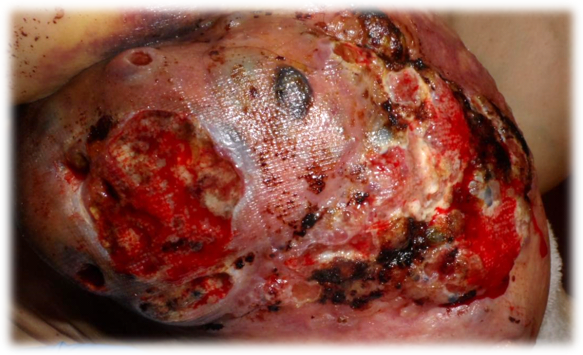The video above depicts a 68 year old woman who had first noticed a lump in her breast 8 years earlier, but she did not seek treatment because she was overwhelmed with the death of her father and suffered a stroke due to a blood clot.
She was placed on Coumadin for the clot, but because she was worried about bleeding, she decided to take a reduced dose of Coumadin and add aspirin. On her first visit she had a very large vascular mass on the right breast with ulcerations that bled easily, and there was a foul odor. We recommended she stop taking aspirin, which was likely the major contributor to oozing with dressing changes.
The odor was treated with topical Flagyl. Aggressive chemotherapy began. The tumor shrank in response to chemotherapy. 5 months later, she decided to stop chemotherapy because it made her so ill. She started a ketogenic diet.
We recommended treatment with “Blast-X,” an anti-biofilm agent (now a 3M product). Within a month the odor was gone. Two months after beginning the ketogenic diet and Blast X, there was no further odor or drainage. On her last visit 3 months after starting the ketogenic diet and Blast-X, she had skin over the tumor. However, the tumor had begun to grow.
I don’t know whether it was the anti-biofilm agent or the ketogenic diet that controlled the odor and drainage. Unfortunately, the ketogenic diet did not prevent tumor growth.

Dr. Fife is a world renowned wound care physician dedicated to improving patient outcomes through quality driven care. Please visit my blog at CarolineFifeMD.com and my Youtube channel at https://www.youtube.com/c/carolinefifemd/videos
The opinions, comments, and content expressed or implied in my statements are solely my own and do not necessarily reflect the position or views of Intellicure or any of the boards on which I serve.




Yes, wound odor management can be quite burdensome for patients. I like the idea of the Blast-X to control odor. We have had success with BSN’s Sorbact WCL as well.
Thank you for sharing this. I see many patients who have deferred treatment and thus present with locally advanced breast cancer with ulcerating disease. We have installed a medical grade hyperbaric chamber in my oncology clinic. I hadn’t thought of using HBOT in this situation until reading of your experience, and I will try the topical antibiofilm as well. Some of our patients do use the ketogenic diet, but we have not seen much effect in met breast cancer.
Dawn Lemanne, MD, MPH Board-Certified Medical Oncologist Director, Oregon Integrative Oncology Clinical Assistant Professor of Medicine, University of Arizona
oregonio.com 541-282-4568
********************************************************************************************* This message and any attached documents are privileged and confidential. In that email is not a secure form of communication, the privacy of this message cannot be assured. Any review, retransmission, dissemination, or other use of this information by other than the intended recipient is prohibited. Please notify sender if you have received this in error. *********************************************************************************************
On Thu, Apr 11, 2019 at 1:34 PM Caroline Fife, MD wrote:
> liwebguy posted: ” The video above depicts a 68 year old woman who had > first noticed a lump in her breast 8 years earlier, but she did not seek > treatment because she was overwhelmed with the death of her father and > suffered a stroke due to a blood clot. She was place” >
From what I understand, the keto diet is good for preventing certain cancers. But once cancer has taken hold, it is not effective in reversing growth of cancerous tumors.
Dr. Fife, Thank you for sharing this extremely useful information! I see many patients who have deferred treatment and thus present with locally advanced ulcerating breast cancer. We have installed a medical grade hyperbaric chamber in my oncology clinic but I’m red-faced to admit I hadn’t thought of using HBOT in this situation until reading of your experience. The topical antibiofilm sounds useful as well. Some of our patients do use the ketogenic diet, but we have not seen much effect in met breast cancer.
Dawn Lemanne, MD, MPH
Board-Certified Medical Oncologist
Director, Oregon Integrative Oncology
Clinical Assistant Professor of Medicine, University of Arizona
Could it be that Keto starves a bacterial biofilm of food, but once it becomes cancerous then it’s no longer amenable to starvation?